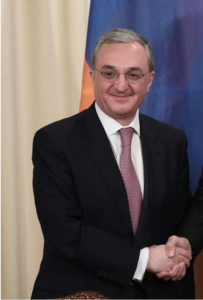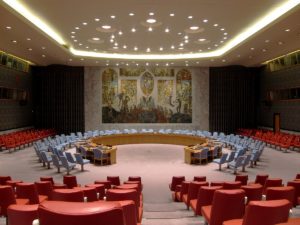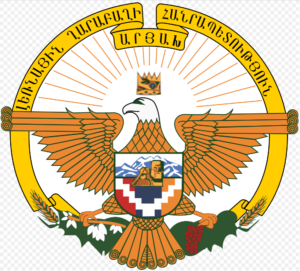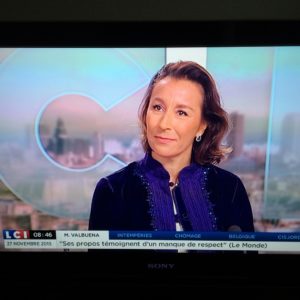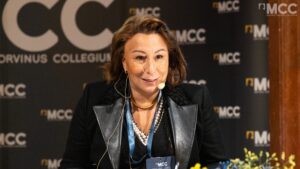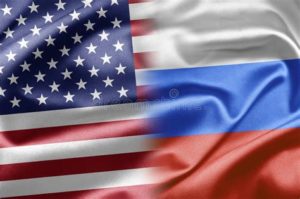Interview réalisée par Caroline Galactéros le 10 octobre 2019 à Erevan (Arménie)
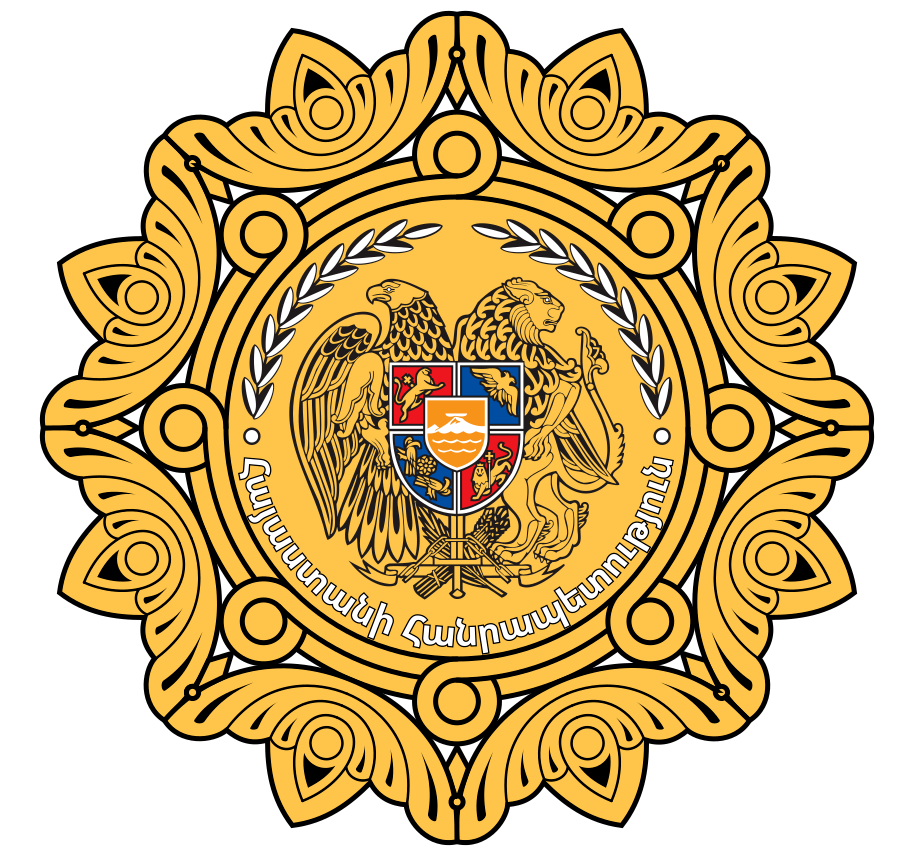
Caroline Galactéros: Armenia has a central role to play and must change the image we usually have of Armenia: that Armenia is far away, in a complicated part of the world.
Mr. President, how do you see Armenia’s position globally in the balance of powers? What do you think about the relation between Russia and the US? And, about China?
AS: Balancing between great powers’ politics is a complex geopolitical gesture for a state like Armenia. This is especially the case for a country being located in an endemically fragile region such as the Black Sea-Caspian, which represents a historical epicenter for competing or aligning great and middle powers with their distinct interests. Therefore, having asuccessful foreign policy for Armenia is a strategy of survival and development, which necessitates hard choices taken in line with the national interests and collective ambitions of our nation. Being at the crossroads of civilizations, empires and powers for thousands of years, means challenging various interests of great powers. It is obvious that the world we are living in yields broad opportunities to the small states like Armenia to play an influential role in modern geopolitics and geo-economy in evolving international system.
The historical Armenia was, not only here, in South Caucasus, but further down the Anatolia at the source of the rivers Tigris and Euphrates. Being local for centuries is not easy, especially when there are tribes coming from the North, from Mongolia, from central Asia and coming and becoming, and creating their own empires, like the Ottoman Empire. Armenia had for thousands of year also very intense relations with those nations, states that were around: Parthians, Hellenes, Romans and so on. But let me take back from there. Hence, being almost under pressure, we were always fighting to survive and develop. So, when you have that for thousands of years, it becomes your genetic code. So, we are a Nation of survivors.
CG: How Armenia identify itself on the stage of international politics? What’s Armenia’s goal?
Armenia is a somewhat unique actor of international relations that can be identified as a small power -being a small coherent state with big ambitions and being a global nation at the same time. One of the reasons was that Armenians were traders, creating networks around the globe. We were always on the roads of trading between India and Europe, between East and West. After the day we became the first Christian statewe believed in our faith, our destiny. We create a place where we can worship, which is the church and the second one is the school. That’s the other genetic thing of how you survive.
Armenia sticks in to promote an inclusive cooperation and partnership with all powers, highlighting our capabilities to play a bridging role, and a role of big data hub in international arena.
Human resources are not just about the number, but also about the quality, about the culture, about education, about behave, about the family. Armenia has inherited a good academic research, which has value, and Armenia was a place where we had high-tech industry in the Soviet Union.
I’m an example of that. I was taught here in mathematics and physics. I became a researcher and professor at University here, and I was teaching also in other cities of Soviet Union, ended up teaching at Cambridge University and then visiting many universities in the world, also French and American.
Here in Armenia, we must look to build the faith. The faith is not only in God but also in your nation and in your state, that’s again the motivation, that’s something that pushes you to conquer. The second is to invest in the future.
So, it’s the state that should build his future on the faith, consolidation, motivation, and on a mission. Without mission, we’ll be lost.
And the second part of that is the mission for the future that means children and education. That’s why the future of Armenia is in new technology, high-tech, mathematics and so on…
CG: You had this famous Forum… Armenian Summit of Minds.
AS: This is one of the events, the first one. In 2019 in summer we organized a worldwide conference here, in Armenia. The French Dominique de Villepin and many other personalities were here. It was a combination of technology and politics. We will have another one this year, with the specific focus on geopolitics and artificial intelligence.
In the 21st century, it’s not only the century of technology, we’re using a lot of iPads, telephones, we’re a lot in a virtual life, and the virtual life influences us, because Facebook, Twitter have huge influence on what’s happening. In the future, a lot of politics and geopolitics will be run quantumly. As a quantum physicist, I have my own theory on how it’s going to be run. This is out of a book which will come out later this year about the quantum of global risks, it’s the basis of quantum politics. It means that many things are uncertain, what is going to happen between the United States and China. This is uncertain. How does a young French talented former minister of economy become a president in a couple of years?
CG: But he had solid supports.
AS: It’s not only about the solid supports. He was the one who really understood how to run it. People around might understand how to run it and how to win an election in the 21st century. And that method is called Quantum. I have a theory how to do that. I can teach you. Next time you can win yourself.
CG: This could be a good idea.
AS: This is a world that is going to be very virulent, dynamic, it will be changing all the time. And again, those nations, or individuals who think about their survival and development, who think they can adapt very quickly in changing environment that can adjust themselves : they can rise very quickly after falling.
Armenia has good relations with Russia and we are a member of Eurasia Economic Union which is an advantage for a small country. When you think about Armenian market, you don’t think about three million, but around two hundred million people in Eurasia Economic Union. On the other hand, Armenia has signed the Comprehensive and Enhanced Partnership Agreement with the European Union. It gives a unique chance to Europe to act with the Eurasian Economic Union the other way around.
CG: Your country could be a precious bridge, the Bridge between Europe and Eurasia…
So, we are member of the Eurasian Economic Union, and have strategic agreement with the European Union, traditionally we possess deep relations with the United States and Latin America because there is a big Armenian community, and the Armenian lobby in different States and in the Congress is quite strong. Then Armenia traditionally has very good relations with China which is admittedly a rising global power with its ambitious inter-continental projects one of which represents the “Belt and Road Initiative” designed to change the geo-economic paradigm of the entire Eurasia significantly. On one hand, being a Eurasian Economic Union member, with simultaneously developing strategic ties with the European Union Armenia, on the other hand expresses unhidden interest to integrate into China’s projects, thereby investing in Greater Eurasian Partnership for the sake of prosperous and advanced future. In so doing, Yerevan’s deepening relations with Beijing appears as something natural because we were there all the time. If you go to China, even if you go to Singapore, the famous hotel in Singapore, the Raffles Hotel, was built by an Armenian family. And if you go there, you’ll find nearby an Armenian church as usual. So, Armenians are in Singapore, in Hong Kong, one of the founders of Hong Kong Bank, which became the Hong Kong and Shanghai Banking Corporation.
Summing this up, it is worth noting that Armenia strives to effectively harmonize the different multinational integration platforms in our adapting foreign policy strategy. I am of the opinion that in the globalized world, which currently undergoes rapid technological evolution the countries like Armenia can transform a structural constraint yielded by geography into an advantage.
CG: What you’re calling faith, family, heritage, culture, history, what does matter…
AS: That’s going to be more and more important. Because if you look at the
same thing from a different angle, one which is going to become important is the
structure of your state and your nation as well. Because demography matters.
Demography fate will have a big influence on what’s going to happen.
It’s not only about religion. It’s about the consolidation of a nation. When I speak about faith, I don’t speak about religion. Religion is a part of it.
CG: The next question is about one of your beauties here, your touristic potential. But of course, this touristic development is completely linked to the perceived global security level, perceived from outside. So, it’s linked with the present situation with Azerbaijan…
AS: No, it is not. First of all, this is one of the most secure countries in the world. Armenia developed a self-sufficient and sophisticated system of itsown security. We are confident on it, improving and honing the defensive capabilities and the entire security architecture consistently. The dispute pertaining to the status of Nagorny Karabakh populated by Armenians (Armenia’s historical province of Artsakh) originated in the early 20th century when in a result of the Russian Empire fall the nations of Transcaucasia, for a while though, embarked on establishing own statehoods. Armenia obtained a chance to regain its centuries-lost independence. The politico-military contest with regards to Nagorny Karabakh has reinvigorated with the dissolution of the Soviet Union in early 1990s, followed by anti-Armenian bloody pogroms in Baku and Sumgait, perpetrated by Azerbaijani nationalists. The rising tensions culminated with a full-scale hostility launched by the government of Azerbaijan aimed at oppressing and muting the unarmed Armenian population of Nagorny Karabakh forcefully in 1991, who took the streets for their own freedom and unification with Armenia since 1988. Consequently, the aggressor was repelled with tripartite ceasefire regime negotiated and established in 1994. To date the ceasefire regime is kept, except sporadic local incidents. Therefore, the ceasefire order is in place, with the close monitoring of OSCE Minsk Group Co-Chairmanship mediatory platform and the architecture of conflict containment works. To sum up, Armenia is capable of projecting its security environment relying on the combination of its own power, internal coherency, institutional resilience and democratic consolidation, which makes our country an absolutely safe place.
Number two, tourism is many things. Infrastructures, transportations, airports, airlines and many other things. Nice restaurants…We have all of them: we have a perfect airport, we have fantastic restaurants, and you can find great French food here. Why? Because there are Armenians from France, from Iran who are cooking amazing Iranian food, from Lebanon and Syria you’ve got the best Syrian restaurants. You don’t get that in Europe. You get a nightlife here, Italian restaurants.
And so on, you get the local food, so this is a beautiful country and tourists can come to Georgia, to Armenia, these two are historic Christian states, with Muslim heritage traces as well. We have a phenomenal growth of tourism this year, and the reason was the image of Armenia. It’s a country where we had a Revolution without bloodshed. So, it’s emotional, it’s virtual, it’s quantum.
In Armenia, how did we do the Revolution? Dancing, singing, the President going to the square, negotiating with the opposition, the future Prime minister, I did it. So, there is a tourism, historic tourism, religious tourism, national tourism. There are 10-12 million Armenians living abroad. So, if you change the perception, how you look at the country, you’ll get a lot of tourism. Tourism is rising in Armenia.
CG: What could France do to help Armenia? I’m not speaking about the French Armenian community; I’m speaking about the institutional France.
AS: To be honest, I don’t like the word “help”, but rather “friendship,” or “partnership”.
We can be a friend and a reliable partner, and we know how to value our friends and partners. We need to combine our efforts and establish mutually beneficial interactions in a number of fields. We should create new platforms of cooperation that would culminate in a result-driven interdependence and effective partnerships.
What is there for France in Armenia? And there is a lot for France as we’re a francophone country hosting a French university, a French high school and a college. In our capacity of a member of the Organisation internationale de la Francophonie, we hosted le Sommet de la Francophonie last year here in Armenia. We have so much in common between our cultures, history, and civilizational interactions, including strong ties between France and the Armenian kingdom of Cilicia with his rulers of Armenian branch of the French Lusignan dynasty, with mixed marriages between princes and princesses, with cultural and linguistic interferences and so on…
Now, we must work on building new bridges of cooperation in areas like nuclear energy, artificial intelligence, space technology, data security, tourism, agriculture, parliamentary diplomacy, and much more.
It’s about meeting our interests, our science, technology, and industry, and culture. That’s why the Office of the President launched an initiative called “ATOM” (Advanced Tomorrow). This is about partnering with the worldwide known big international companies in new technologies. And do you know the best ones we’re working with now? Dassault, Thales… which are indeed French companies. They are one of the best in the world, and they come to Armenia to find ways of cooperation with us in research and development, in mathematics and so on. So, this is about friendship and partnership.
CG: We have still to go on to be in this quantum society in France. We have other problems, and we have also this problem of faith in our nation State. That’s for sure. But we don’t want to realize it, because we are afraid.
AS: That’s the wrong approach. If you have a problem, you must face it. If you don’t face the problem, then that problem will hit you, psychologically, it will hit your time. You have a choice. This is happening in real time in Armenia.
You look carefully at Armenia, you get a closer friend to Armenia, you invest in Armenia, and then you learn what’s happening here. That’s the choice number one. Choice number two, there is a film we call Black Mirror, you watch it and you’ll see the horrors of the next quantum world that we are entering. Because most of them are realistic. This is coming. The things that you see there are coming.
So,
you have a choice, real life, possible bright future which is Armenia’s.
CG: You spoke about this very peaceful revolution, incredible things which happened in Armenia, which is an example for so many other countries. But do you think people knew exactly what was going on? I mean, I think it was not very well known in the West.
AS: In the West? No, of course. It’s an image that you get, it’s a perspective you get from CNN, or BBC, RT, or newspapers, articles from Figaro up to the Times.
CG: I spoke with journalists and there was not so as much for the correspondents who came… The Revolution was so short, and they think…
AS: That’s the beauty. Imagine all the journalists would come here. It happened so quickly. It happened like a chain reaction, like a nuclear reaction. You start with a couple of high energy particles hitting and the reaction will start. And it started with high energy, it was the fact that people were unhappy generally and it started two weeks after my inauguration, so I became president, the new Constitution started working, the former president wanted to become a Prime Minister, people were unhappy, there were small groups of young energetic opposition people, including the camp of the Prime minister, and the speakers of the Parliament. They started walking from Gyumri to Yerevan…
A couple of weeks after, you had 200 000 or even more people at the Republic square.
CG: My last question is about Turkey. What to do with Turkey? Because of the 2009 protocols, is it over? It didn’t work. What to do, trade?
AS: Personally, I didn’t believe it was going to work due to many reasons. And those reasons go from geopolitical configurations to cultural and historic components. Our relations with Turkey remain complicated.
One of the reasons rests on Turkey-Azerbaijan relationship dimension. Apart from the issue of Armenia-Turkey protocols, Azerbaijan wields disproportionate impact on Turkey not only in virtue of the political capitalization of investments in Turkey’s economy and energy sectors. In parallel to energy diplomacy formulated for years aimed at playing important role for Turkey in obtaining energy or transporting thereof, Baku also plays with pan-Turkic sentiments to draw palpable influence on Turkey and in Turkey to serve its own national interests in competition with Armenia. As a result, we have shared but closed border with Turkey. In fact, the only closed border in Europe not to be in the best interests of our countries, especially with the immense economic potential still remains untapped.
On the other hand, we cannot afford to ignore the collective standpoint of the Armenian Diaspora. The question of the Genocide recognition is still there. To be honest, it’s up to Turkey to recognize genocide or not. Because the recognition would be good for them. The moment they recognize that, they’ll become closer to the civilized community of nations, much more a nation that will embrace the values of tolerance, tolerance to other people, to other countries, to other nations, to anything.
…You must have a revolution in order to change the textbooks. So, if Turkey decides to do so, it would revolutionize their history and culture, they would have to change many things.
CG: Concerning the resuming of a dialogue between Yerevan and Ankara, from which side should it come from in your opinion: Armenia or Turkey?
AS: It is up to the Turkish side. If they want to talk. I’ve done it once, officially, in my interview to Swiss television. They asked me « if you would see today Mister Erdogan, what you would tell him ». I said: « Good morning », because it was morning, and then I was saying that I’m not the president of Turkey, I’m the president of Armenia and my ancestors come from the Western Armenia which is now Eastern Turkey and probably there’s something we have to talk. I didn’t emphasize. It’s something I think we must talk about. Turks are usually very sensitive, they give reactions, in this case it was an absolute silence. Which is fine. …. So, it’s up to them. We have learnt to live without, with closed borders with Turkey and Azerbaijan, and we will continue.
CG: If the process of Minsk group could start again working.
AS: But the OSCE Minsk Group Co-Chairmanship format has not stopped. It’s still working there, and I will not comment on that because it’s my government, foreign minister and Prime minister who have to negotiate and they will get all of my support, whenever they do that.
CG: Perhaps, if you would have something to just say, to stress on a « sujet libre » as we would say in France.
AS: I already did it. You started by provoking me.
CG: It wasn’t my intention. Would you like to share about something you think is representative of your country? The faith, the culture, the history?
AS: The faith as an internal identity, which is your mission, your focus, your national discipline, your faith culture and education, everything. And if you have that faith in yourself, then you can win. You can be successful, and I’d love to be successful with our friends in France.
That’s my final word. Not only because I like the history, because I have so many friends, not only because France is important (I think working with French mathematicians, physicists is a pleasure), but also because I love Paris.
Pour plus d’informations sur ce voyage :
Pour consulter l’intégralité du numéro 29 de la revue Europe et Orient de juillet/décembre 2019 : https://edsigest.blogspot.com/2019/11/eo-29-le-monde-dans-un-jeu-de-go.html et https://europeetorient.blogspot.com/
Geopragma adresse tous ses remerciements aux Editions SIGEST pour leur aimable contribution à la réalisation de ces interviews

